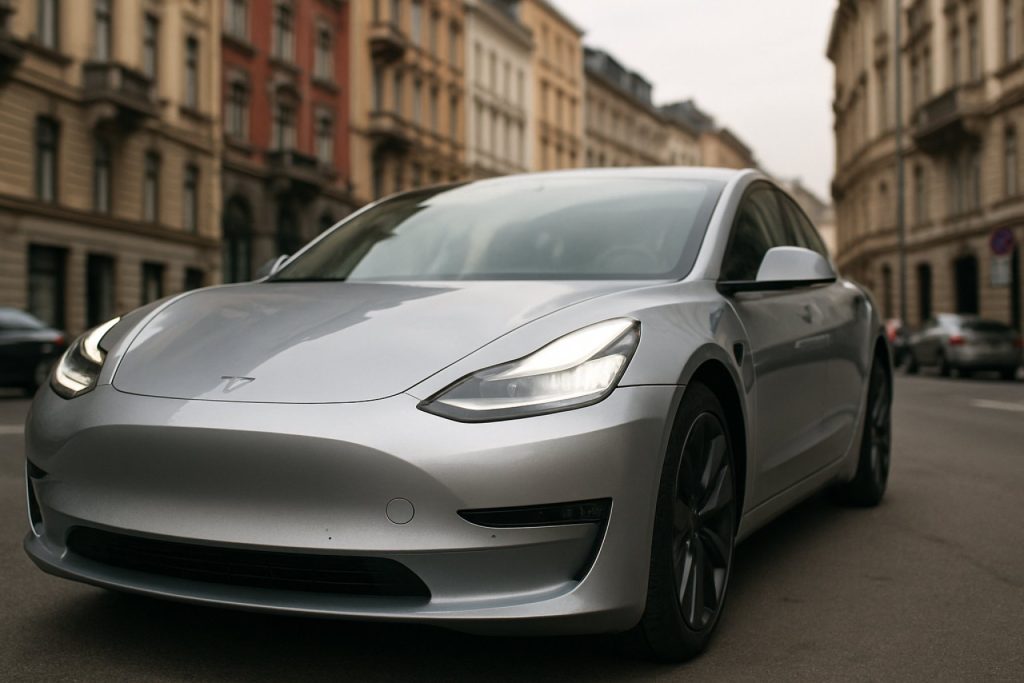
- Tesla’s European sales plunged by 49% year-on-year in April, marking four consecutive months of decline amid a booming electric vehicle market.
- Overall EU electric car sales rose more than 26% in the first four months of 2024, highlighting Tesla’s struggle against surging competition.
- BYD, a major Chinese EV maker, overtook Tesla in monthly European sales for the first time, signaling a shift in consumer preference.
- Consumer backlash over Elon Musk’s political controversies has hurt Tesla’s brand image and loyalty across Europe.
- Traditional brands like Volkswagen and Renault are gaining ground with a wider range of electric and hybrid options tailored to local markets.
- The European electric vehicle market now prioritizes trust, values, and local relevance as much as technology and performance.
The electric hum that once powered Tesla’s unstoppable rise across Europe now sounds more like a warning siren. Tesla’s latest sales data reveals a dramatic slump: over half of its new vehicle registrations vanished in the European Union last month, even as more Europeans than ever flocked to battery-powered cars. Where others saw fertile ground, the American EV giant hit an unexpected skid.
Across the broader continent—including the UK, Norway, and Switzerland—Tesla’s European sales collapsed by 49% year-on-year in April. The figures paint a stark contrast to the rest of the Tesla story, as electric vehicle sales across the EU shot up by more than 26% over the first four months of 2024. The fall marks the fourth straight month of declining annual sales for Tesla—punctuating a period of unprecedented turmoil for the company and its CEO, Elon Musk.
Controversy and Competition Collide
Behind the numbers, two storms converge. On one front, Musk’s recent political entanglements have stirred controversy, sparking consumer backlash across Europe. The billionaire’s forays into far-right politics in both Germany and the UK, paired with his polarizing U.S. persona, have ignited protests and forced many previously enthusiastic fans to reconsider their loyalties.
On the other, Chinese electric vehicle makers have launched a bold offensive. In April, the Chinese giant BYD overtook Tesla in monthly European sales for the first time, according to data from JATO Dynamics. While BYD’s margin was razor-thin—just 66 battery electric vehicles (BEVs) more than Tesla—the symbolism was striking. BYD’s quiet rise in a market Tesla once commanded signaled a seismic shift in European automotive tastes and priorities.
The Landscape Shifts
Competition has intensified in Europe’s increasingly crowded EV market. Brands like Volkswagen, Renault, and now BYD, offer a spectrum of electric and hybrid options tailored to European roads and wallets. Meanwhile, Tesla’s lineup, still comprised solely of BEVs, faces new scrutiny from cost-conscious and eco-savvy buyers.
The sales woes arrive on the heels of Tesla’s first global annual sales dip in 2024, and its steepest-ever quarterly plunge in Q1—losses that prompted a net income drop of 71%. For a company that once defined the gold standard of the EV revolution, the latest European numbers represent not merely a trip, but a potential turning point.
What’s Next in the EV Race?
As electric vehicles grow from niche to norm, the tides are shifting not just in technology, but in trust and leadership. Consumers are watching: they want innovation, but not at the expense of values or local relevance. European drivers, long courted by global brands, are now choosing with sharper eyes and deeper expectations.
If Tesla wants to win back its crown, it must reckon with more than specs and software updates. The EV future will be shaped as much by consumer sentiment and geopolitical winds as by kilowatts and range. As the market surges forward, one lesson emerges: In Europe, trust may now matter just as much as torque.
For more updates about electric vehicle innovation and industry shifts, visit Tesla.
Tesla’s European Sales Crash: Surprising Reasons Behind the EV Giant’s Downfall (And What It Means for the Future)
The latest Tesla sales plunge across Europe has left industry watchers buzzing. In April, Tesla’s European vehicle registrations fell by a staggering 49% year-on-year—even as electric vehicle (EV) sales in the region surged. The electric vehicle pioneer now finds itself on the defensive in a market it once dominated. Let’s dive into the additional facts, industry trends, controversies, and practical insights overlooked in recent coverage, and answer your top questions.
Why Tesla Sales Collapsed in Europe: Deeper Dive
1. Intensified Competition and Changing Consumer Preferences
– European automakers like Volkswagen, Renault, and Stellantis have ramped up affordable, Europe-centric EV choices. Models like the Volkswagen ID.3 and Renault Megane E-Tech offer advanced features, competitive pricing, and strong after-sales support—qualities highly valued by European buyers.
– Chinese brands such as BYD, NIO, and MG (owned by SAIC) have rapidly expanded European operations, often undercutting Tesla on price while matching or exceeding build quality.
– Industry data shows BYD (Build Your Dreams) is now the world’s top EV producer by volume, and in 2023, its Atto 3 and Seal models were among the top-10 bestsellers in several European countries.
– Increasing numbers of hybrid and plug-in hybrid vehicle launches appeal to buyers concerned about charging infrastructure.
2. Price Wars, Incentives, and Discounts
– Tesla slashed prices across Europe in late 2023 and early 2024 to spark demand, but competitors responded with aggressive deals and incentives, sometimes making local brands more appealing.
– Bloomberg reported that resale values of used Teslas have declined in some markets, troubling buyers who expect strong residual value.
3. Manufacturing and Delivery Challenges
– European buyers have faced long wait times for new Tesla vehicles due to supply chain disruptions and manufacturing delays at Giga Berlin.
– Some European nations (such as Germany and Norway) have ended or lowered EV subsidy programs. This has disproportionately impacted Tesla’s premium models, as less expensive EVs remain eligible for support.
4. Features, Tech & Compatibility Issues
– Tesla’s infotainment and driver assistance tech was industry-leading, but competitors have caught up with innovations like VW’s ID.OS 3.0 and Peugeot’s i-Cockpit.
– The standardized CCS charging connector is now commonly available on all competitors, while Tesla’s Supercharger exclusivity is less impactful after opening the network to non-Tesla brands in Europe.
5. Reputation Problems and CEO Controversies
– Elon Musk’s public comments—especially around far-right politics—have caused unease among European consumers, known for prioritizing sustainability, inclusivity, and regulatory compliance.
– Tesla’s ongoing labor disputes in Sweden and Finland, including a mechanics’ strike and support from dockworkers, have slowed deliveries and generated negative headlines.
How-to: Choosing the Right EV in Europe
1. Compare total cost of ownership (purchase price, incentives, charging, maintenance, and resale value).
2. Test drive top models and review charging infrastructure compatibility in your area.
3. Research user and expert reviews (see BYD, Volkswagen, Polestar).
4. Watch for warranty details, after-sales support, and update schedules.
Life Hacks for Current and Prospective EV Owners
– Use route planners (like ABRP or PlugShare) to ensure seamless charging on long drives.
– Consider second-hand EVs as prices become more competitive.
– Join local EV communities for real-world feedback and deals.
Pros & Cons: Tesla vs. Competitors
| Feature | Tesla | Volkswagen | BYD |
|—————–|——-|————|——-|
| Price | $$$ | $$ | $-$$ |
| Range | Excellent | Good | Good |
| Tech/Autopilot | Advanced | Catching up | Advanced (in China, moderate in EU)|
| Charging Network| Best (Supercharger) | Good | Fair|
| Resale Value | Declining | Stable | Too early to tell|
| Service Network | Growing, but reports of delays | Extensive | Expanding|
| Brand Perception| Mixed/trending negative | Positive | Positive/new entrant|
Controversies & Limitations
– Tesla faces regulatory investigations in Germany and the Netherlands over data protection and accidental acceleration events.
– Critics argue Musk’s climate and labor stances do not fully align with European values.
– Increased scrutiny of imported Chinese EVs: The EU is preparing to impose tariffs on made-in-China vehicles, which could reshape competition for both Tesla and Chinese brands (Reuters, 2024).
Industry Trends & Market Forecasts
– S&P Global Mobility projects Europe’s EV market will grow by >20% in 2024, but Tesla’s European market share could fall below 10% for the first time.
– BloombergNEF predicts 50% of new car sales in Europe will be electric or hybrid by 2030.
– Renault, Volkswagen, and Stellantis plan to launch sub-€25,000 EVs by 2025, targeting cost-sensitive buyers.
Security, Sustainability & Future Insights
– Tesla’s Berlin Gigafactory claims to use renewable energy, but Greenpeace has criticized the company for lack of supply chain transparency (Greenpeace).
– Security researchers note Tesla’s ‘always-connected’ vehicles could be targets for hacks; ensure software is regularly updated.
– Sustainability of battery sourcing, especially from conflict-free zones, remains a critical European concern.
Most Pressing Questions Answered
– Will Tesla recover in Europe? Only by regaining consumer trust, speeding up local production, and addressing cost competition.
– Are Chinese brands here to stay? Yes, but future EU tariffs could dampen their momentum.
– Is it a good time to buy an EV? Yes—more brands, models, and deals are available than ever, but research local incentives first.
Actionable Recommendations and Quick Tips
1. Check for the latest EV incentives in your country; many are set to expire in 2024.
2. Compare long-term service and warranty support—not just purchase price.
3. If reselling is a concern, look for brands with traditionally strong residuals.
4. Stay up-to-date on EU tariffs, which may affect new EV prices by next year.
5. Stay plugged into official resources like the Tesla or BYD websites for direct announcements, recalls, and updates.
Final Word: Trust, Tech, and the Battle for Europe’s EV Soul
Tesla’s sales collapse is about more than just numbers—it’s a referendum on trust, value, and European priorities. As the energy transition accelerates, expect more fierce competition, better choices, and smarter consumers than ever before.



